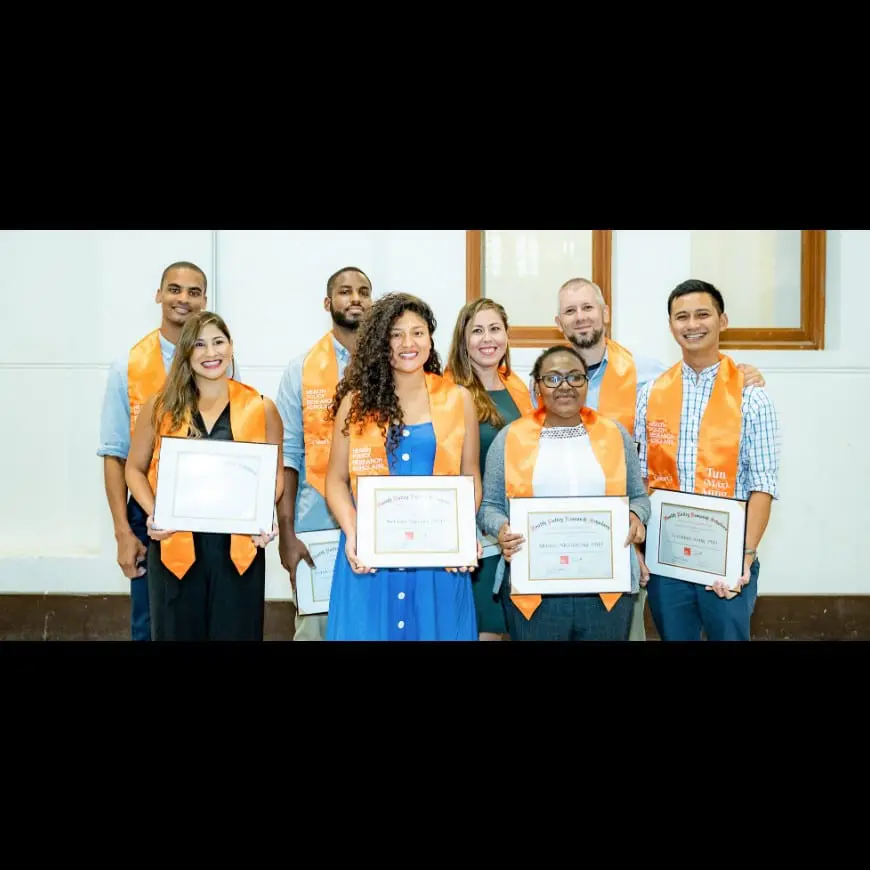Eight scholars are graduating from the Health Policy Research Scholars leadership program—as well as their doctoral programs—to become postdoctoral fellows, assistant professors, and leaders at organizations of all kinds. Each scholar has been a valued member of their cohort and has contributed to the program in ways that have pushed our thinking and challenged our assumptions. While their leadership journeys are only just beginning, these scholars have already made incredible impacts within their fields and toward building a more equitable future.
Read more below about their dissertations, plans after graduation, and reflections on being a part of the Health Policy Research Scholars’ community.

Andrew Anderson, PhD in Health Policy and Management, University of Maryland College Park
Dissertation title: Connecting the Dots Across the Care Continuum: Addressing Behavioral Health In ACO Networks
Plans after graduation: Research Scientist, National Committee for Quality Assurance (NCQA)
“The health care system needs to be reimagined. Medical bills are bankrupting families, avoidable mistakes kill thousands, and minority communities continue to disproportionately feel the effects.
But at this point in particular, I am SO optimistic for what we can do. My parents immigrated to this country for the health of their families. I am ready to help develop better answers to how we can create a healthier and more just society.
HPRS gave me the network and the tools to join the cause to make our health care system better, safer, and more equitable.”
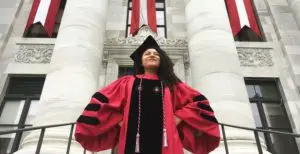
Seciah Aquino, DrPH in Public Health, Harvard University
Dissertation Title: Reaching the Unreachable: Insuring the Remaining Uninsured in Massachusetts
Plans after graduation: Senior Manager of Health and Public Benefits, California Immigrant Policy Center
“To my Robert Wood Johnson Foundation HPRS family who encouraged and inspired me every step of the way—thank you. I can’t wait to see how we’ll radically transform the world together. Dr. Thomas LaVeist, Dr. Lydia Isaac, and Dr. Harolyn Belcher, your vision for HPRS provided me with the support I needed to achieve this dream. Beyond the excellent training and much needed financial support, you provided me with a beautiful family and lifelong support system. Thank you, Robert Wood Johnson Foundation for believing in us.”
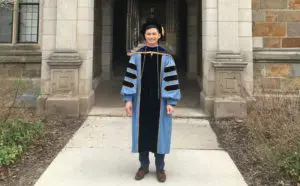
Max Aung, PhD in Environmental Health Sciences, University of Michigan
Dissertation Title: Toxicant Exposures and Biomarkers of Immune Perturbations During Pregnancy
Plans after graduation: Postdoctoral fellow, University of Michigan Biostatistics Department and Precision Health Data Science Center
“HPRS equipped me with the academic, professional, and financial resources that allowed me to explore independent collaborations, pursue policy relevant opportunities, and develop a well-rounded doctoral education.”
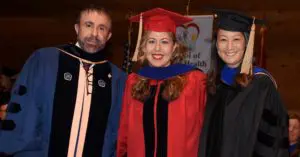
Michelle Doose, PhD in Epidemiology, Rutgers University (pictured center)
Dissertation Title: Examining the Multilevel Influences on Diabetes and Hypertension Clinical Care Management Among Breast Cancer Patients
Plans after graduation: Postdoctoral fellow, Cancer Prevention Fellowship Program at the National Cancer Institute
“With support from the HPRS Dissertation Award, my doctoral research examined the implementation of evidence-based clinical practice guidelines for diabetes and hypertension among a cohort of Black breast cancer survivors. Only half of the patients within the cohort received care based on these guidelines during the year following their breast cancer diagnosis. Patients with shared care (care provided in collaboration among multiple caregivers, which might include the patient and their family as well as social service providers) were more likely to receive clinical practice guidelines for diabetes and hypertension compared with patients who only saw cancer specialists. This research identified important gaps in care and will inform future care coordination work given that diabetes and hypertension unequally burden Black breast cancer patients and may account for half of the breast cancer survival disparity among Black and white women.”
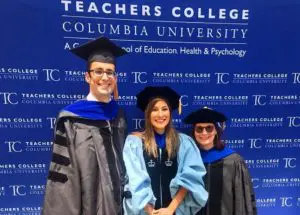
Andrea Duran, PhD in Biobehavioral Sciences (Kinesiology), Columbia University (pictured center)
Dissertation Title: Exploring Sedentary Behavior as a Secondary Prevention Target for Heart Disease
Plans after graduation: Postdoctoral Research Scientist in Implementation Science, Department of Medicine at Columbia University Irving Medical Center
“HPRS has positively impacted my research trajectory by exposing me to interdisciplinary colleagues and innovative fields of research that have challenged me to tackle my research agenda through a systems-level lens, which has enabled me to further align my research endeavors with my passion to elicit meaningful, lasting impact on societal health.
HPRS has truly shaped my research trajectory. If it weren’t for this program, I would have never pursued a graduate research supplement in Geographic Information Systems (GIS) or a postdoctoral fellowship in Implementation Science. Not only did HPRS give me exposure to both fields, it also offered support and made efforts to put me in contact with the right people. After expressing an interest in Implementation Science, HPRS staff put me in contact with a scholar from another cohort, who introduced me to his mentor, who is now a co-mentor on my National Heart, Lung, and Blood Institute (NHLBI) postdoctoral research supplement.
Overall, HPRS has truly been an invaluable, integral part of my PhD experience and I am beyond grateful to have been a part of the HPRS family. I hope to continue as an active alumni member and mentor future HPRS members.”
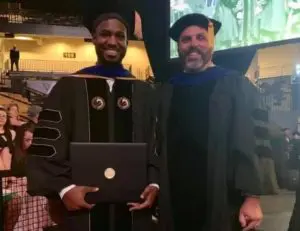
Harvey L. Nicholson, Jr., PhD in Sociology, University of Central Florida (pictured left)
Dissertation title: Socioeconomic Status and Prescription Opioid Use Behaviors Among U.S. Adults: A Test of the Fundamental Cause Theory Framework
Plans after graduation: Assistant Professor of Sociology, Department of Sociology and Criminology & Law at the University of Florida
“To ensure our research has the greatest impact, we must think about how it can influence policy at every stage of the research process. True policy change depends on this mindset.”
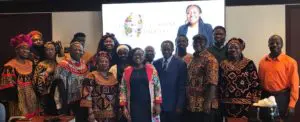
Manka Nkimbeng, PhD in Nursing, Johns Hopkins University (pictured front center)
Dissertation Title: Understanding Physical Function in African Immigrants: The Roles of Acculturation and Discrimination.
Plans after graduation: Robert L. Kane Postdoctoral Fellow, University of Minnesota School of Public Health
“HPRS has made a significant impact on me and my research. The training I received through the HPRS program has shaped not only my understanding of how to impact the policy process, but has also shaped my research ideas and career plans. The program has helped me to really understand and ensure that I develop and conduct research that can inform health policies. That understanding has informed my dissertation research questions and, now that I am going into intervention development, it is even more applicable in ensuring I develop interventions that can be implemented into health policies.
Additionally, the social support, mentorship, and career advice I have accessed through the program is immense. My cohort-mates have been my writing accountability partners, peer mentors, and confidants. The wonderful health and policy leaders that are either faculty or guest speakers during our training have been wonderful to meet, get to know, and emulate. I am forever grateful that I was selected as one of the scholars in this wonderful program.”
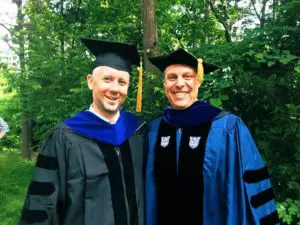
Paul Shafer, PhD in Health Policy and Management, University of North Carolina Chapel Hill (pictured left)
Dissertation Title: Effect of the Affordable Care Act on Utilization of Emergency and Primary Care
Plans after graduation: Assistant Professor of Health Law, Policy, and Management, Boston University School of Public Health
“Being a Robert Wood Johnson Foundation Health Policy Research Scholar has helped me develop into a more complete researcher, bringing together lenses of multiple disciplines to consider the myriad individual and social determinants of health. It also provided the funding to be more ambitious with my dissertation, giving me a lot of threads to pull on in future work. The training in scientific communication will have a huge impact on how I frame new questions and disseminate my research. I can’t wait to see what a few hundred of us can accomplish in helping to create a Culture of Health!”
(Pictured on the group photo: The eight Health Policy Research Scholars graduates at the Smithsonian Arts and Industries Building in Washington, D.C. Back row from left to right: Andrew Anderson, PhD, Harvey L. Nicholson Jr., PhD, Michelle Doose, PhD, Paul Shafer, PhD, and Max Aung, PhD. Front row from left to right: Andrea Duran, PhD, Seciah Aquino, DrPH, and Manka Nkimbeng, PhD.)

